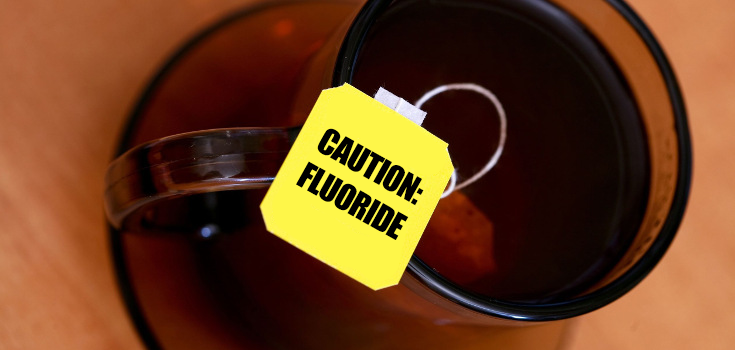Is Your Tea Loaded with Toxic Fluoride?
Is Your Tea Loaded with Toxic Fluoride?
Some teas are safer than other
An increasing percentage of the population has been getting smart about the dangers of drinking cola and other kinds of soda pop, and they’re abandoning it in droves. So as an alternative to soda, individuals are choosing boxed and bottled tea as a primary substitute beverage. This is no surprise because tea has a list of health benefits that can’t be ignored. But unless you know which teas to choose, you may be simply trading evils and consuming toxic fluoride.
For those of you who haven’t really read about fluoride before, Fluoride is a toxicindustrial waste chemical put into many communities municipal water supplies. While most of Europe rejects water fluoridation and many communities in the U.S. choose to end fluoridation due to activism, most communities still choose to fluoridate their water despite the known health dangers this toxin can have on the human body.
All tea plants have an affinity for fluoride, so indiscriminate consumption of tea can lead to soaring levels of fluoride in the body, especially if it’s brewed it with fluoridated water. The result can be dental fluorosis, a badly damaging discoloration and mottling of tooth enamel.
This is one of the first signs of over-exposure to fluoride, and it can lead to skeletal fluorosis, a painful and debilitating bone disease that rivals the damage done by to the skeleton by drinking highly acidic cola drinks over time. And like cola’s dissolving of bone, skeletal fluorosis comes on insidiously, and can be mistaken for several other bone and joint diseases.
Susceptibility to fluorosis varies throughout the population, and whether it manifests or not depends on the dose and duration of fluoride intake. Heavy tea drinkers and those with kidney impairment are the most likely to come up with this disease.
Tea drinking can cause “lose cartilage (a form of collagen), that cushy connective tissue between bones, discs in the spine, in the elbows, and hips — basically all those places that hurt,” says Doctor of Naturopathy Donna Voetee, also known as Granny Good Food, a more seasoned version of the Food Babe. “In fact, your ‘arthritis’ may not be arthritis at all, but merely an overindulgence in the brown brew.” She notes that tea drinking may be behind much of the parabolic rise in hypothyroidism too.
Adding to this list, natural health advocate Dr. Joseph Mercola says fluoride increaseslead absorption and tumor and cancer growth, and causes genetic damage, muscle disorders, and cell death. It has been implicated in dementia and bone cancer as well.
There’s no doubt that tea has a high level of fluoride, but the polyphenols in the best teas are able to mitigate some of this. Polyphenols are powerful anti-oxidants that have given tea the reputation of a healer through its ability to counteract oxidative stress in the body. Experts have reported that one of the ways fluoride causes damage to cells is through oxidative stress. This means the high antioxidant status of top quality teas can stop some of the impact of fluoride.
Are You Drinking Tea with Lower Levels of Fluoride?
The teas that produce the highest levelsof fluoride are those that contain the lowest antioxidant levels. The reason is that antioxidant level is lowest in teas made with old leaves, and this is also when fluoride level is highest. Conversely, antioxidant level is highest in teas made with young leaves, and this is also when fluoride level is lowest. This makes the fluoride level of a tea its indicator of quality.
If you are interested in reducing exposure to fluorideand the harm that may come with it, choose white tea, the tea that is made from young leaves. This does not mean you can avoid fluoride in tea by drinking white tea, only that your fluoride exposure may be less than with other types of tea.
Black tea is made from the oldest leaves and the widely researched green tea also has a high content of fluoride. White tea confers almost all of the same health benefits as are found in green tea, and it has a milder, more pleasant flavor.
Other Popular Stories:

Post a Comment